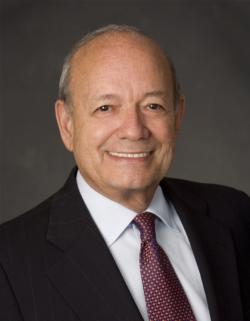Friedman Issues Response to President Trump’s Travel Ban

Pace President Stephen Friedman. Photo Courtesy of http://cicu.org/sites/default/files/imagecache/trustee_detail_image/Stephen_Friedman_Pace.JPG
Pace President Stephen Friedman issued a statement to students and faculty in the wake of President Donald Trump’s executive order banning refugees and others from seven predominantly Muslim countries on Fri., Jan 30.
Friedman gave the community guidance on how they should conduct themselves during this new controversial order and gave assurance in the future.
Friedman said in the statement:
“As a university, we are equally concerned about the students, faculty, and staff who may be affected by this executive order. Their safety and well-being remain our highest priority. We support them and will do everything we can to maintain an environment that welcomes them to study, work, and enjoy the benefits of an education at Pace University.”
Friedman urged anyone who’s a citizen of the seven countries—Iran, Iraq, Libya, Somalia, Sudan, Syria, or Yemen—to not travel outside of the U.S. for the next 90 days.
An anonymous Pace faculty member who is from one of these seven countries couldn’t agree more with Friedman’s warning.
“It was the right advice given from our president,” they said. “If there are students who go to one of these countries, they will not be able to come back.”
The faculty member also noted that it would be pointless to go back because they would not receive the same level of education at one of these seven countries.
Friedman also advised students or scholars on a non-immigrant visa who need help to seek out Pace’s Assistant Vice President for International Programs and Services Barry Stinson.
“We are doing all we can to support our students. We value them as a key part of the Pace community, they bring the world to Pace by sharing their global perspective and in turn, they experience the culture and values of the U.S,” Stinson said. “International students have been coming to the U.S. for their education for decades, and leaders of other countries have been educated here in the U.S.
“As a result of this executive order, one of my main worries is that the U.S. will become less attractive for international students and we will ultimately lose out on this cultural exchange. ”
Stinson is updating student about the travel ban by posting updates on his website.
Stinson and Friedman are urged students to attend information sessions on the Immigration Executive Orders, conducted by the Immigration Justice Clinic Elisabeth Haub School of Law.
Pace Law School Professor and Director of the Immigration Justice Clinic at John Jay Legal Services Vanessa Merton aims for this clinic to be informative for students who seek legal advice against a Muslim ban.
“We are offering informational sessions where we will be laying out some of the problems that people are going to be confronting,” Merton said. “We are also providing information about individual legal representation where that could be obtained reliably.”
Merton has been preparing to advise students on this since Trump discussed the idea of a Muslim ban. However, there were still parts to the ban that caught her off guard.
“The attack on people with green cards and visas was not anticipated,” Merton said. “Also, we never dreamt that they would act while people were in the air or getting on the plane.”
Merton has been impressed with the job lawyers have done by prioritizing advice and counsel to those affected by the ban.
Your donation supports independent, student-run journalism at Pace University. Support the Pace Chronicle to help cover publishing costs.
